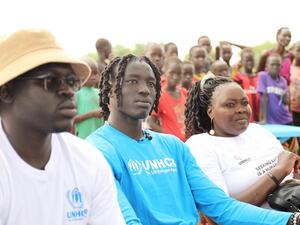UNHCR urges stepped up help for CAR and South Sudan refugees
UNHCR urges stepped up help for CAR and South Sudan refugees

A displaced Central African woman ponders her situation in the shelter of a church in Boali, a town north of Bangui. She and others like her need the support of the international community.
GENEVA, March 4 (UNHCR) - The UN refugee agency on Tuesday said it was increasingly concerned about the immediate needs of refugees from Central African Republic and South Sudan arriving in neighbouring countries, in particular Chad, Cameroon and Ethiopia.
"We are appealing to our partners and the governments in these countries to help speed support to these populations - which although still relatively small in number are nonetheless in urgent need of assistance," UNHCR spokesperson Melissa Fleming told journalists in Geneva.
The crises in South Sudan and the Central African Republic (CAR) have together caused one of the biggest refugee and IDP (internally displaced person) situations Africa has seen in recent years, forcibly displacing some 1.8 million people across a region with very sparse support capacities.
Within South Sudan, there are almost 740,000 people who are internally displaced and a further 196,000 sheltering in neighbouring countries. The UN estimates that by June as many as 3.2 million people could be in need of humanitarian help. Already food security is a problem.
In the Central African Republic, there are just over 700,000 IDPs and a further 290,000 have fled to other countries. More than half the country's 4.6 million people are currently in need of humanitarian help.
"In Chad, Cameroon, Ethiopia and other locations where refugees are arriving, the help effort for refugees arriving from these conflicts urgently needs stepping up," Fleming said.
In Cameroon, an estimated 30,820 refugees have arrived so far this year from the Central African Republic and are facing shortages of clean water, food and shelter. Many are in poor physical shape and suffering from malaria, diarrhoea and respiratory infections contracted while they had been in hiding in the bushes in CAR.
"Many children under the age of five are showing varying degrees of malnourishment, also related to lack of food in CAR. Pressures on local communities are also rising with the influx, and help is needed for them too," Fleming said.
She noted that in southern Chad, some 8,000 Central African Republic refugees are in the area around Sido. Many people are without shelter and are camping in the open beneath trees. Lack of clean water and a shortage of latrines are problems. "As existing refugee camps in this part of Chad are saturated with new arrivals, UNHCR is advocating with the government to identify a new site where we can better address refugees' pressing needs, particularly for food, clean water, latrines and health services," Fleming said.
In Ethiopia, UNHCR field staff have been seeing refugees arriving in poor condition due to the lack of food inside South Sudan and the long distances that many have had to walk to reach the Pagak and Akobo border areas. Medical screening last week revealed that 27.7 per cent of children were suffering from global acute malnutrition and 11.1 percent from severe acute malnutrition.
"With our partners, we have immediately put in place a blanket supplementary feeding programme for children under five years of age, and pregnant and lactating mothers," Fleming said, while adding that "the increasing numbers of new arrivals are outpacing available humanitarian resources."
Meanwhile, funding for both the Central African Republic and South Sudan emergencies remains far below needs: For CAR, the United Nations is seeking US$551 million for 2014, of which UNHCR's needs are US$112 million, of which only 9 per cent has been received so far. With South Sudan, the UN is seeking US$1.27 billion by June 2014, of which UNHCR's portion is US$55 million. The refugee agency has received only US$12.4 million of the amount it has requested.








